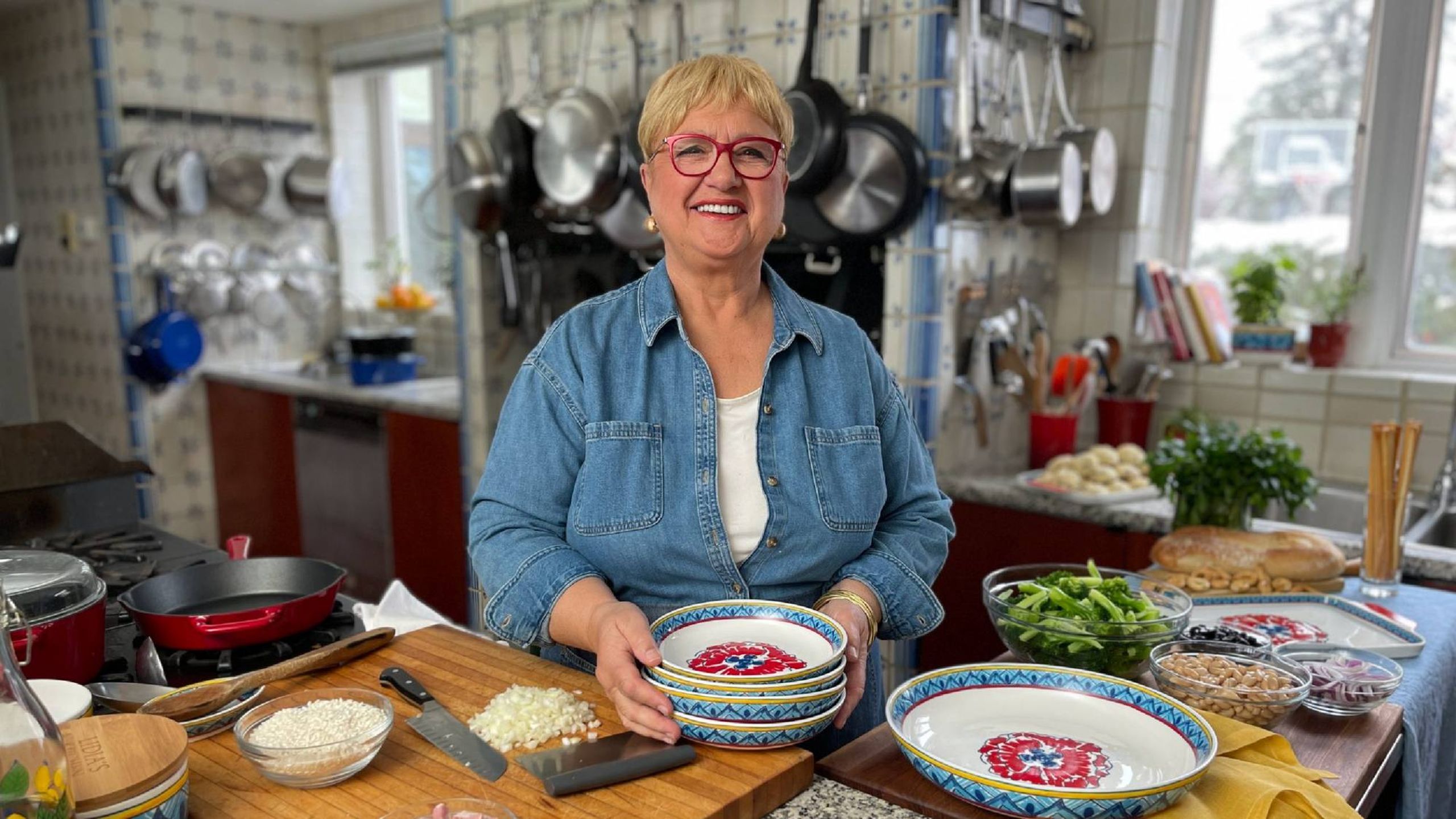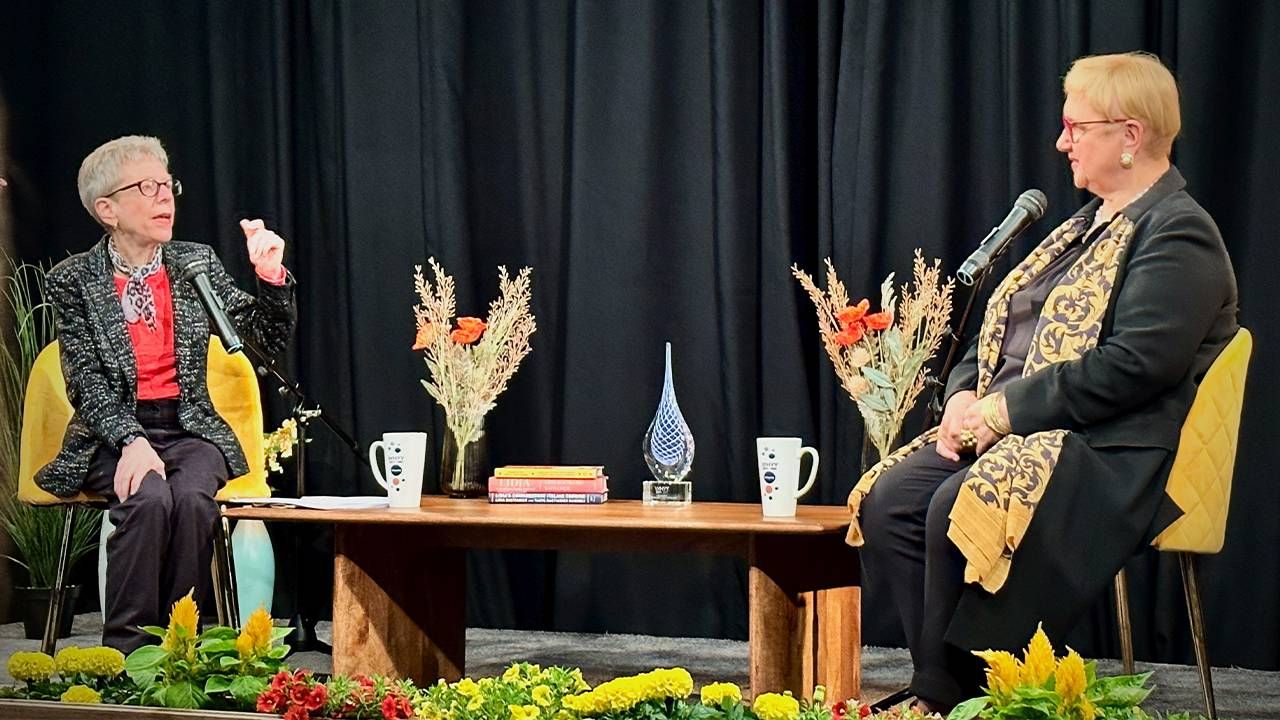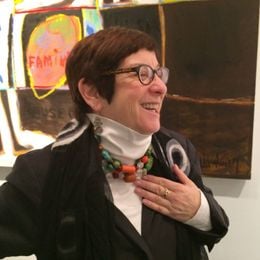Chef Lidia Bastianich: Beyond Food
With ‘Flavors That Define Us,' the PBS host wants to awaken a more compassionate understanding about America’s new immigrants
During an exclusive, one-hour interview with charismatic chef Lidia Bastianich, I came to appreciate how, like many icons, "Lidia" is best known by a solo moniker. In Philadelphia to receive WHYY-TV's 21st Lifelong Learning Award, Lidia simultaneously exuded star quality and the deep authenticity for which she is celebrated.

The centerpiece of this gala fundraising evening was a rare live audience interview by NPR "Fresh Air" radio host, Terry Gross, with Lidia, who disarmed Gross' most penetrating questions with her wit and genuineness.
The event was also an opportunity to celebrate the chef's 25 years on PBS, and to tout the latest episode in the "Lidia Celebrates America" series called "Flavors That Define Us." This special, which will also stream on PBS.org, will air on Tuesday, May 30 on PBS stations at 9 p.m. ET — check local listings for details.
"You know, they need to feel that they relate, that they learn, that they wanna take this trip with you."
By coincidence, the evening held one more personal connection. Lidia, 76, often tells her television origin story, explaining that shortly after she was "discovered" by PBS' initial luminary chef, Julia Child, she was approached about having her own show. As the story goes, Lidia responded that she would do a television show as long as it was in her own home and on PBS, just like Julia.
I was curious about where the spark for that first show originated. WHYY's CEO and president, Bill Marrazzo, and a close friend of Lidia, provided the answer: It turns out that a quarter-century ago, WHYY presented the concept for Lidia's show to the PBS system for universal distribution, making this occasion a true homecoming.
Her Love for America
Lidia elaborated on the inspiration for the new "Flavors That Define Us" episode. Taking a step back to the beginning of the series itself, she explained that "about 13 years ago, I felt that I wanted to thank America in my way because I see a lot of positive things in America, but sometimes I feel that America is maligned."
"And this country is the best country in the world. There's no place like it," she continued, leaning in across our table, hands folded on the desk, her signature gold bangles clinking.
"The American people are grand — they're really wonderful people — open and all that, but somehow it gets ..." her voice trailed off a bit while her hands insinuated the thought "a bad rap."
The Value of Viewers' Trust
"And so, since people trust me because of my longevity on air, and my cooking, and all that, you develop a trust," she said with a smile. "You have to have the trust of your viewers, otherwise you're nowhere. You know, they need to feel that they relate, that they learn, that they wanna take this trip with you."
"Lidia Celebrates America," the series that began as her thank you to "this wonderful country" that "took me in as a youngster and gave me and my family this great opportunity, and hence my children and my grandchildren," has morphed. Lidia now also seeks to remind viewers that America once was a kinder, gentler place. With "Flavors That Define Us," Lidia wants to leverage that trust of her viewers to help create a more welcoming place for immigrants.
'My Entrée Is Always Food'
Lidia offered her thoughts on immigration. "So now we come to this confusion about immigration. And it's in the whole world. I think I heard that there is, what is it, 21 wars going on in this world? Something like that?" Lidia said, sitting back in her chair. "I thought, let me go out there as an immigrant, myself. Let me go out there in America because America is built on immigrants."
"When you sit with somebody at the table, and you share a table, that's the base, the common denominator."
Growing more animated, she said: "Let me tap on this — on the immigrants — and see what they're feeling. How were they accepted? Did they respect or regret coming here? And what were their difficulties? And, you know, my entrée is always food. It's because, of course, when you sit with somebody at the table and you share a table, that's the base, the common denominator."
The upcoming episode of "Lidia Celebrates America" is seminal for her. And perhaps a bit more oriented towards activism than the previous ones in the series. Although food is always her foundation, in the "Flavors That Define Us," Lidia, an immigrant herself, dares to take a deeper dive into the question of what it means to be an American.
From Refugee to Immigrant
In 1956, Lidia and her family were political refugees who had fled from communist Yugoslavia.
Lidia was born in 1947 in Istria, then a part of Italy that is now Croatia. After World War II, when Italy lost, Istria became part of communist Yugoslavia, and Lidia's family was caught behind the Iron Curtain. They were forbidden to speak her native Italian or go to church.
However, as a child, spending a lot of time with her maternal grandmother and grandfather who lived just outside Istria, Lidia got to speak her native Italian and also occasionally sneak to church.
In 1956, Lidia and her family were political refugees who had fled from communist Yugoslavia.
Ostensibly, this life seemed to have a natural cadence: her grandparents had ducks, geese, pigs and goats, and grew potatoes and rosemary. She played. She didn't starve.
But the reality was bleak and horrific. The communists never allowed a feeling of well-being to prevail. "They would knock on doors and take away the men for questioning; sometimes [they] returned after days or weeks of incarceration," she recalled. In her village, they sought out the sons and the husbands, who sometimes were tied together with barbed wire, and pushed down alive into the rocky, vertical caves that dotted the area to die in prolonged torture, often over days.
It is an understatement to say Lidia truly understands the plight of the refugee. "In 1956, my parents decided that they needed to move. They couldn't raise their children in communism. So, my mother, brother and I went over to Trieste, Italy claiming we were visiting a sick aunt," she recounted. Her father couldn't leave because the authorities "always kept someone as a hostage." But "he made a daring escape, dodging bullets with dogs chasing him."
It was then that her family turned themselves in as refugees seeking asylum. They were placed in a refugee camp called San Saba, which in fact, had been a Nazi concentration camp. Men were separated from the women. Conditions were grim.
The family stayed in the camp for two years. "When we were finally accepted elsewhere, it was to the United States, where Dwight Eisenhower was president." Catholic Relief Services readied them for immigration and Catholic Charities then cared for and helped establish them, finding them a home and a job for her father, who was a mechanic. They knew no one in the United States.
"The care America had at that time for immigrants was very moving, and we certainly felt that it was our responsibility of giving back and becoming part of America as soon as we could," she said.
A Program With a Purpose
Lidia explained how she selected her guests for "Flavors That Define Us," by returning to her own immigrant story. "I came [to the U.S.] in 1958," she explained. "That's after World War II. Now the recent immigrants are from the Ukraine, so we featured a Ukrainian."

"And, going back into America's past immigrant history, I picked Christina Ha, a Vietnamese chef from Houston, Texas. I thought she needed to be highlighted because she's going blind. And despite this, she has restaurants and has continued to cook," Lidia said.
"What was interesting about her, related to me," she continued. "Christina told me, 'You know, Lidia, I was born in the United States. My parents came as immigrants, so I'm second generation. But I always had these double sentiments. When I was home, I was Vietnamese and American when I was out.'"
"I related to that because, initially, when I came [to America] as a 12-year-old, I was ashamed of not being able to speak the language, not being able to communicate," Lidia said. She emphasized that her own experiences made her eager to learn her new American language and culture while maintaining her native one.
Finding the Comfort Zone
Lidia confirmed how much she loves her adopted country and that she gives back freely and joyously of her time to all manner of requests for it. In fact, the evening before the WHYY-TV Award, Lidia had been the emcee for The Path to Peace Gala Dinner honoring the United Nations High Commissioner for Refugees, Filippo Grandi, at the Pierre Hotel in New York City. Catholic Charities and the Vatican also hold a special place of reverence in her heart for the role they played in helping her family escape and integrate into American society.
By sharing her personal story, Lidia believes she can feed not just the stomachs, but the minds of middle Americans.
Lidia has a gleam in her eye when she discusses using her platform to help her audience, whom she believes are "good, everyday Americans," to see how vital it is to "fully accept and integrate these wonderful immigrants."
She speaks from her own immigrant experience about people who "are needy, begging for a home, for a peace, for a place that they can raise their children." She believes wholeheartedly that her efforts can help deflect the unwarranted feelings of "the American that's afraid."
By sharing her personal story and using her familiar and comforting approach – food and cooking – Lidia believes she can feed not just the stomachs, but the minds of middle Americans. By stirring the pot gently, she hopes to allay unreasonable fears, allowing Americans to savor the flavors that immigrant cultures bring to the table.
"You need to put the American mind in a comfort zone," she concluded.
What better way than doing so than through cooking, food and Lidia?


